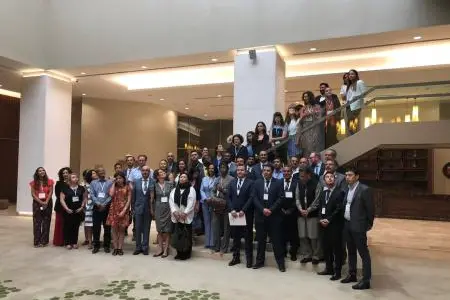PHOTO
Jeddah, Kingdom of Saudi Arabia - A capacity-building workshop on tapping the potentials of Islamic finance for achieving the Sustainable Development Goals (SDGs) has been organized jointly by the Islamic Research and Training Institute (IRTI) of the Islamic Development Bank (IsDB) Group and the United Nations Development Program (UNDP) in Istanbul, Turkey.
The workshop, held on 28-30 August 2018, aimed to build capacity of development practitioners in exploring opportunities provided by Islamic finance towards meeting targets of the 2030 Agenda. More than 60 participants attended the workshop from Central Asia, Africa, and the Middle East.
Islamic finance, with its growing momentum in recent years, reached a global asset size of about $2 trillion, comprising Islamic banking, asset management, and capital market instruments. In addition to the pace of growth of the commercial Islamic finance industry, Islamic social finance tools such as zakah, waqf and non-profit microfinance have been gaining attention at the global level.
In the context of this growing interest in Islamic finance and the need for comprehensive capacity building for development practitioners, UNDP and IRTI, along with other partners, jointly organized the capacity-building workshop in Istanbul. This followed the first such workshop held on 7-9 May 2018 in Jakarta, Indonesia.
IRTI Director General, Dr. Humayon Dar, said, “As a global think tank specializing in Islamic development, IRTI will continue to collaborate with global institutions like UNDP to build capacity of development practitioners and other stakeholders towards mobilizing Islamic finance for the SDGs.”
Acting Manager of Training at IRTI, Dr. Rami Abdelkafi, said “There is a consensus that concerted efforts are needed to mobilize more resources for the SDGs, and Islamic finance offers a significant opportunity in this regard. Building the capacity of development practitioners in the field of Islamic finance is very important to enable them explore the potentials of Islamic finance in terms of resource mobilization and impact on the real economy.”
About IRTI:
The Islamic Research and Training Institute (IRTI) is a Member of the Islamic Development Bank (IsDB) Group responsible for enabling the development and sustenance of a dynamic and comprehensive Islamic financial services industry, which supports socio-economic development of member countries and Muslim communities worldwide. More information about IRTI is available on www.irti.org. For media enquiries, contact Habeeb Idris Pindiga (hpindiga@isdb.org).
© Press Release 2018Disclaimer: The contents of this press release was provided from an external third party provider. This website is not responsible for, and does not control, such external content. This content is provided on an “as is” and “as available” basis and has not been edited in any way. Neither this website nor our affiliates guarantee the accuracy of or endorse the views or opinions expressed in this press release.
The press release is provided for informational purposes only. The content does not provide tax, legal or investment advice or opinion regarding the suitability, value or profitability of any particular security, portfolio or investment strategy. Neither this website nor our affiliates shall be liable for any errors or inaccuracies in the content, or for any actions taken by you in reliance thereon. You expressly agree that your use of the information within this article is at your sole risk.
To the fullest extent permitted by applicable law, this website, its parent company, its subsidiaries, its affiliates and the respective shareholders, directors, officers, employees, agents, advertisers, content providers and licensors will not be liable (jointly or severally) to you for any direct, indirect, consequential, special, incidental, punitive or exemplary damages, including without limitation, lost profits, lost savings and lost revenues, whether in negligence, tort, contract or any other theory of liability, even if the parties have been advised of the possibility or could have foreseen any such damages.




















